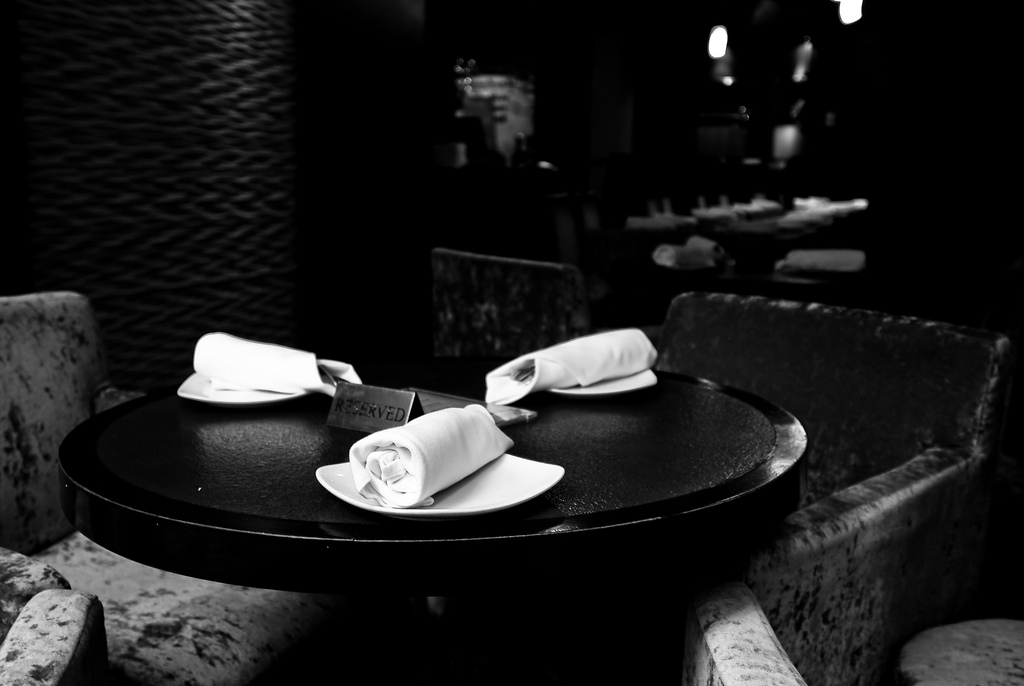No shows, patrons who fail to show up for reservations or forget to cancel on time, are a constant source of pain in the restaurant industry. Everyone knows the stories, someone's car broke down, a babysitter cancelled, there was a death in the family. Excuses abound, and though many have legitimate reasons for missing a reservation, more still are blissfully unaware of how their casual attitude affects restaurant owners. As a recent article in the Edmonton Journal highlights, when a reservation is missed, it is highly likely that the table will remain empty, and the revenue that the restaurant was counting on goes out the door (actually, it never came in).
With restaurants, which already run on very slim profit margins, missed reservations and last minute cancellations can have a drastic affect on the business's bottom line. With larger restaurants, the effects might be minimal, as they may be able to fill tables last minute. However, for smaller restaurants, the effects are compounded, and a missed reservation can mean the difference between making a profit or taking a loss for the evening. When a guest makes a reservation, the restaurant plans ahead in terms of front and back of house staff, as well as food and supplies. An empty table can mean a lot less in tips for a server, or an unneeded chef in the kitchen who gets sent home. For restaurants with specialized menus, this can mean wasted food and resources as well.
So how can a restaurant help to avoid missed reservations? Well there are a couple of tactics, some of them at odds with consumer preferences. An easy solution, but one that is not foolproof, is to have restaurant staff call a day or two ahead of time to confirm a reservation. This gives consumers a reminder, and also an easy opportunity to cancel or change their reservation should the need arise. Another option is to use technologies such as OpenTable software, so that patrons are reminded via the application on their smartphone, and can cancel easily without having to call the restaurant. OpenTable also has policies in place to penalize users for missed reservations. A restaurant can report a no show, and it permanently marks the diners OpenTable account. After four no shows in a year, the customer is permanently banned from the service. While this does present a more streamlined way of dealing with reservations, it too, is not fool proof.
Another option, one that tends to dissuade consumers, is to require a credit card for reservations and charge a fee to those who fail to show up or who cancel within a certain period. Many restaurants, especially in larger cities, utilize these policies, and charge $25-$100 per person for missed reservations. While this may seem extreme to consumers, for most restauranteurs, the fee still does not completely recoup the losses caused by missed reservations (though some experts offer advice on how to optimize your reservation policies and fees to increase revenue). OpenTable, which allows restaurants to require a credit card for online reservations, discourages no-show fees, believing them to be a turn off to potential customers. Many restaurants are comprising by refunding customers their no-show fee in the form of a gift card, alleviating tension while also giving the customer a very compelling reason to re-book. If your restaurant is considering charging a no-show fee, it is important not to go overboard. If your missed reservation charge is higher than your most expensive entrée, something is wrong. And unless your establishment is on the extreme high-end of the dining scene, or you require reservations for all diners, a 24 hour policy is probably sufficient, as opposed to requiring 48 or 72 hours notice.
As harmful as now shows, "low-shows", when a party arrives with less people than the reservation called for, are becoming a problem for restaurants. Many restauranteurs feel that low-show reservations are happening with increased frequency. Part of this may be attributed to the chaining ways in which people interact socially. For example someone may post an invite to their birthday party on Facebook, and make a restaurant reservation for 10 guests. Well then it may be that only 5 friends show up for dinner. While this may not seem quite as bad to consumers, from the restaurant's perspective, it is the same as a no-show. These low-show parties are even harder to handle than no-shows, as charging an extra fee to those in the party who did show up is a difficult task, and runs the risk of alienating customers.
How have no-shows and low-shows affected your restaurant? Do you charge a cancellation or missed reservation fee? Let us know your opinions via Facebook, Google+, LinkedIn and Twitter.
Source: Edmonton Journal, Image Credit (Flickr)
Toggle Nav
 Tablebases.com
Tablebases.com
 Tablebases.com
Tablebases.com
Search
Toll Free

